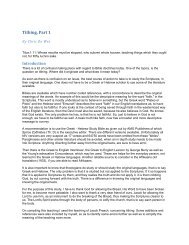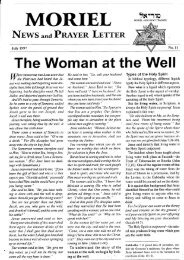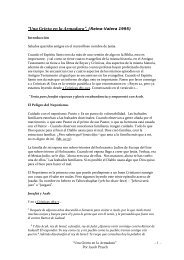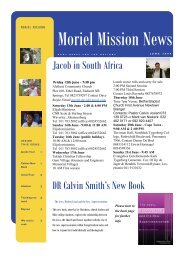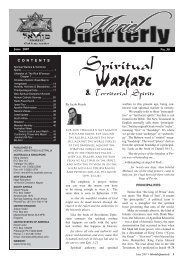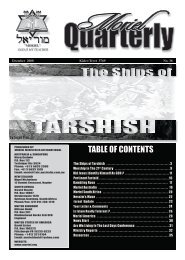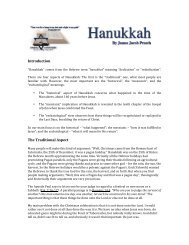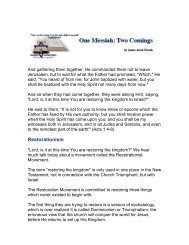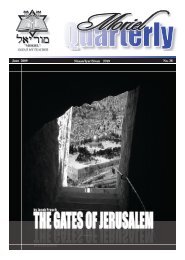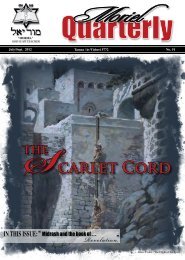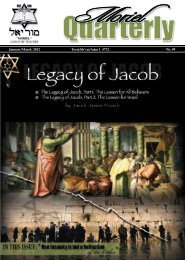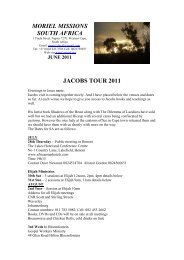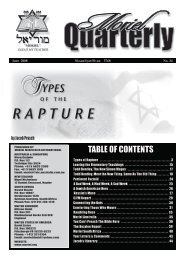The Wedding Feast (~19.49) - Moriel Ministries
The Wedding Feast (~19.49) - Moriel Ministries
The Wedding Feast (~19.49) - Moriel Ministries
Create successful ePaper yourself
Turn your PDF publications into a flip-book with our unique Google optimized e-Paper software.
‘For I will pour out water on the<br />
thirsty land And streams on the dry<br />
ground; I will pour out My Spirit on<br />
your offspring And My blessing on<br />
your descendants; (Isaiah 44:3)<br />
<strong>The</strong> rain being poured out is a picture of<br />
the Holy Spirit. It forms the Living Water<br />
we read about in John 4 and John 7, which<br />
Jesus tells us is the Holy Spirit. So looking<br />
at this again in Hosea 6:1, we see the<br />
wounding, but also the resurrection. <strong>The</strong>n<br />
we see the giving of the Holy Spirit after<br />
the resurrection. What happens to Him<br />
happens to us. His death is to be our death,<br />
His life is to be our life, and the power of<br />
His Spirit is to be manifested in us.<br />
Corporate Solidarity in<br />
Barabbas<br />
<strong>The</strong>re’s a theological term called “corporate<br />
solidarity.” A “corporate solidarity”<br />
is where when one person represents a<br />
larger group of people, where one man or<br />
one woman is a picture of a bigger group<br />
of people. And in the Passion narrative, the<br />
story of the death and resurrection of Jesus,<br />
there are a number of important “corporate<br />
solidarities” – people who are pictures of<br />
us. One of the most important is someone<br />
called in Aramaic, “Bar-Abbas” – “a son of<br />
the father.” We see this when Pilate brings<br />
him out in Luke.<br />
But they cried out all together, saying,<br />
“Away with this man, and release for<br />
us Barabbas!” (Luke 23:18)<br />
“Release for us Barabbas!” Pilate<br />
wants to release Jesus and tries to defer<br />
the matter to Herod. Herod is happy to let<br />
Jesus off as long as Jesus puts on a show.<br />
As long as Jesus would be willing to perform<br />
miracles, Herod was quite willing to<br />
let Him go (Lk. 23:8). Notice that the only<br />
thing Jesus had to do to not go to the cross<br />
was to pull a “Benny” or a “Kenny.” All<br />
He had to do not go to the cross was put on<br />
a religious freak show of signs and wonders.<br />
<strong>The</strong> Lord Jesus never allowed signs<br />
and wonders – what is called in Hebrew<br />
“semeion mipla’ot” – He never once allowed<br />
signs and wonders, healings or miracles,<br />
to be the focus of His message or His<br />
ministry. His ministry was not about that;<br />
these signs followed. <strong>The</strong>re are those who<br />
assert that signs and wonders are the key to<br />
seeing people saved; that was John Wimber’s<br />
argument. But in fact, John 10 tells us<br />
the opposite: “For which one of these signs<br />
are you stoning me” (Jn. 10:32)?<br />
“Faith cometh by hearing, and hearing<br />
the word of God” (Ro. 10:17), not<br />
by seeing a show. <strong>The</strong> Antichrist and the<br />
False Prophet are going to put on a show<br />
and they are going to deceive the nations<br />
Jacob Prasch<br />
(Rev. 16:13-14); they are going to deceive<br />
the Jews; they are going to deceive the<br />
apostate church. (In fact, those people are<br />
deceived already, they are just waiting for<br />
a bigger deception.)<br />
Herod sends Jesus back to Pilate, so<br />
Pilate says, “Well, I have got to get this<br />
guy off somehow – I know He is innocent<br />
– what am I going to do? I know! I am going<br />
to get a terrorist.”<br />
Barabbas was somebody the New Testament<br />
refers to as a “Zealot.” Josephus<br />
writes about them extensively and informs<br />
that they were the “Sukim.” <strong>The</strong>y were people<br />
who used religion as a cloak for what<br />
basically amounted to murder and terror,<br />
very much like Al Qaeda, very much like<br />
the IRA or other people who simply use religion<br />
as an umbrella or a propaganda device<br />
– or as packaging – to what amounts to<br />
criminal activity of the most unspeakable<br />
kind. <strong>The</strong>y preyed on their own people,<br />
and Josephus writes about how the cruelty<br />
of these people against the Jews exceeded<br />
anything the Romans did to them. <strong>The</strong>se<br />
“Sukim,” of which Barabbas would have<br />
been one, acted worse toward their own<br />
kind than anything the Romans ever did.<br />
And so we have “Bar-Abbas.” Not a<br />
Hebrew name but an Aramaic one which<br />
means literally, “son of the father.” “Who<br />
shall I release to you? Bar-Abbas or Rabbi<br />
Yeshua Bar-Jozef ? Do you want me to<br />
give you this terrorist, this murderer, this<br />
criminal, this predator, or do you want me<br />
to give you this rabbi from Galilee who<br />
taught love, peace, and forgiveness – who<br />
raised the little girl from the dead, who<br />
made the blind see, the deaf hear, and the<br />
lame walk – this man of love? Who shall I<br />
give you: Barabbas or Rabbi Yeshua?”<br />
And the same crowd who a few days<br />
before had been singing, “Hosanna!” now<br />
yelled, “Crucify Him! Give us Barabbas!”<br />
At the Triumphal Entry, as long as Jesus<br />
was willing to put on a show they were<br />
all for Him. But when He would not give<br />
them what they wanted on their terms, they<br />
were no longer interested. “Crucify Him!<br />
Give us Barabbas!” Not all, but enough of<br />
them were incited by the religious establishment.<br />
<strong>The</strong> Sanhedrin incited the people<br />
to say, “Give us Bar-Abbas! Give us the<br />
son of the father.”<br />
We are All Bar-Abbas<br />
If someone is born again – if they have<br />
repented of their sin and accepted Jesus,<br />
they have another name. That name is<br />
“Bar-Abbas.” Each of us has become a son<br />
of the Father. “Give us Barabbas!” We have<br />
become a son of the Father because Jesus<br />
was accursed of the Father for our sin.<br />
“Give us Barabbas!” It is always like that.<br />
Give us that cocaine dealer from the<br />
Special Interest<br />
east side of New York, Jacob Prasch. What<br />
shall I do with this rabbi who raised the<br />
dead, who healed the sick, who made the<br />
cripples walk, who taught love, peace,<br />
truth, gave the little girl back her life<br />
– what should I do with Him? Kill Him!<br />
Give us Jacob Prasch. Kill Him! Give us<br />
John Higgins. I become a “Bar-Abbas”<br />
because Jesus, who was innocent, was put<br />
on trial in my place. I am actually guilty<br />
of all the things they falsely accused Him<br />
of – found guilty of sedition, guilty of rebellion,<br />
I was guilty of blasphemy, I was<br />
guilty of deceiving other people – I was<br />
actually guilty of all the things Jesus was<br />
put on trial for.<br />
You can call me “Jacob,” and that is<br />
OK, but just realize that my real name<br />
– and yours – is “Bar-Abbas.” Barabbas.<br />
Why am I Barabbas? Why am I a son of<br />
the Father? Because concerning the true<br />
Son of the Father they yelled, “Crucify<br />
Him!” He died so I could become a son of<br />
God. That is the first corporate solidarity.<br />
<strong>The</strong> Corporate Solidarity of<br />
Simon Cyrene<br />
But then there is another one. According<br />
to Roman law, when a person was to<br />
be executed by Roman crucifixion (the<br />
Jews stoned people; crucifixion was purely<br />
Greco-Roman) the person had to carry his<br />
guilt, which was publicly exemplified or<br />
publicly illustrated through carrying the<br />
cross. <strong>The</strong> guilty person had to carry his<br />
own cross. That was the Roman law. But<br />
here we see that something else happens.<br />
When they led Him away, they seized<br />
a man, Simon of Cyrene, coming in<br />
from the country, and placed on him<br />
the cross to carry behind Jesus. (Luke<br />
23:26)<br />
Why did Jesus not carry His own<br />
cross? Because by Roman law it would<br />
have meant He was guilty of what He was<br />
going to be executed for. He was not guilty<br />
of what He was going to be executed for;<br />
Simon was, I was, you were.<br />
Richard Wurmbrand, a Jewish believer<br />
who became a Christian – my wife’s family<br />
actually knew him before he was saved<br />
from the Jewish community in Romania<br />
– was persecuted as a Jew by the Nazis<br />
and then persecuted by the Communists<br />
as a Christian. <strong>The</strong>y locked him up for 14<br />
years, they arrested his wife, they did terrible<br />
things to them – they tortured him. My<br />
wife could speak to him in Romanian, and<br />
I remember a sermon he once preached in<br />
which he said, “Jesus never simply said, ‘I<br />
am going to die in your place. I am going<br />
to die in your place, but you get up here<br />
and die with Me.’” After two days, He will<br />
revive us; the third day He will raise us up<br />
December 2009 • <strong>Moriel</strong> Quarterly 13




